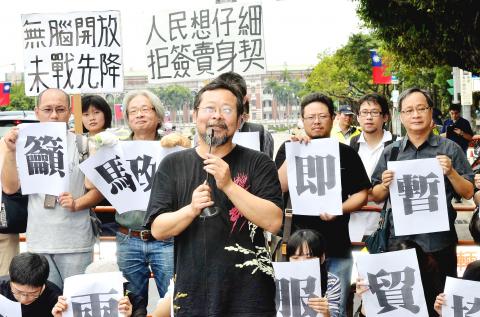|
Groups voice PRC
trade pact concerns
CAUSE FOR ALARM? During a press conference DPP
Chairman Su Tseng-chang said the terms of the cross-strait service pact should
be examined by the legislature
By Loa Iok-sin and Rich Chang / Staff reporters

Musician Chen Ming-chang, center,
and other members of the artistic and literary world protest outside the
Presidential Office in Taipei yesterday over the signing of a cross-strait
service trade pact.
Photo: Chen Yi-chuan, Taipei Times
Civic groups yesterday voiced concerns
over the signing of a cross-strait service trade pact, fearing its potential
impact on Taiwan’s economy and workers.
“The signing of the cross-strait service trade pact in Shanghai could have a
great impact on Taiwan’s economy, since the service industry accounts for more
than 70 percent of Taiwan’s GDP and 58.87 percent of jobs,” Cross-Strait
Agreement Watch convener Lai Chung-chiang (賴中強) said at a news conference at the
Legislative Yuan.
“Along with the agreement itself, the Mainland Affairs Council should deliver
its impact report to the legislature, and the legislature should have an
item-by-item review with the participation of representatives form all
industries affected,” Lai said.
“The council should not unilaterally decide when the pact will take effect
before the legislature completes the review and approves it,” he said.
Taiwan Labor Front secretary-general Son Yu-lian (孫友聯) urged the government to
exercise caution when allowing Chinese workers into Taiwan, to minimize the
impact on the job market.
“Workers should be represented in legislative review sessions for the agreement,
too,” he said.
Meanwhile, a group of people from the arts and cultural industries also staged a
demonstration in front of the Presidential Office yesterday morning, urging the
government not to sign the agreement.
“I am very disappointed that the government did not talk to the people before
signing the agreement. It’s ridiculous that we still do not know anything about
it when the government is to sign it in a matter of hours,” said Chen Ming-chang
(陳明章), a musician.
Writer Neil Peng (馮光遠) called on people in the arts and cultural sectors to
speak out against President Ma Ying-jeou’s (馬英九) cross-strait policy.
“He is selling out Taiwan, we should speak out,” he said.
Lai Ho Culture Foundation and Museum executive director Chou Fu-i (周馥儀), who
organized the protest, said that it may not stop the pact, “but if we don’t say
anything, the government will think we all support what it’s doing.”
Democratic Progressive Party (DPP) Chairman Su Tseng-chang (蘇貞昌) demanded that
the deal be examined by the legislature.
“The contents of the agreement have to be thoroughly examined and reviewed by
the legislature. The process of inking the agreement cannot be done in the
dark,” Su said at another press conference in Taipei.
National policy adviser and publisher Hao Ming-yi (郝明義), as well as Wang Jung-wen
(王榮文), who heads publisher Yuan-Liou Publishing (遠流出版社), accused the government
of ignoring the local publishing sector.
Honigmann Hong (洪財隆), director of the DPP’s China Affairs Department, said
Taiwan has restricted Chinese capital entering Taiwan. However, after the
signing of the cross-strait service trade agreement, Chinese capital and white
collar workers would be able to enter Taiwan with few restrictions, impacting
small-scale industries, particularly the service sectors, he said.
Wang Cheng-hui, general manager of Taipei-based Chinese Creation Publishing Co,
said the pact allows Chinese capital to print any publishing materials in
Taiwan, but Taiwanese capital can only be used to print packaging materials and
flyers in China, a move Taiwanese printers condemned as unfair.
Liang Chin-hsing (梁錦興), general manager of Taipei-based publishing company
Wanjuan Lou, said publishing and printing businesses are jointly run by
state-owned companies in China, but Taiwan’s publishing and printing businesses
are run by small and medium-sized companies. He said the pact would eventually
allow Chinese capital to consume the smaller Taiwanese firms.
Additional reporting by CNA
|
![]()
![]()
![]()